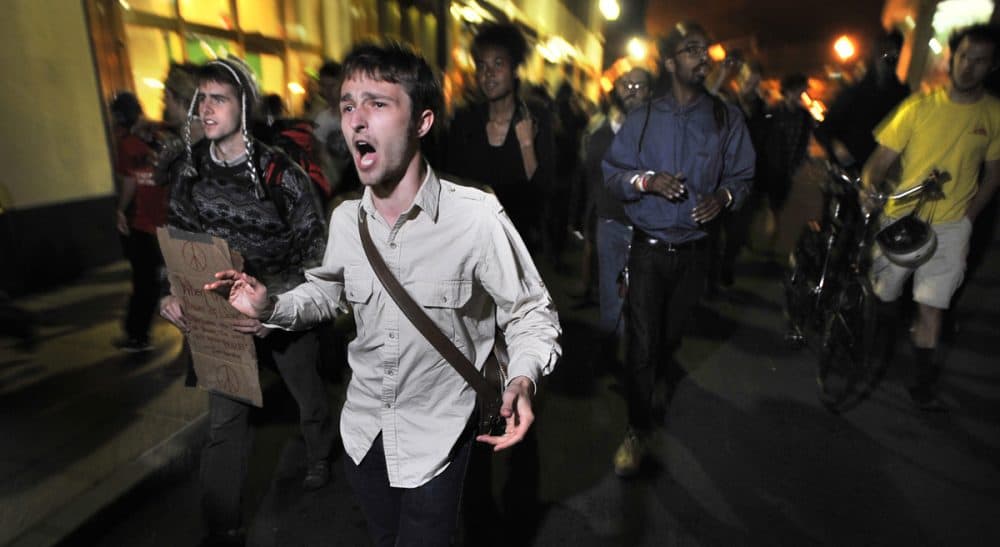Advertisement
The Legacy Of Occupy

Two plus years after the eviction of Occupy Boston protesters, many people have concluded that the movement was just a glorified flash mob.
I feel this mindset ignores the possibility that the world changes, as does the definition of “effectiveness” and the shape of activism. And that railing about failed social change efforts may be undermining the changes we long to see.
Rewind to October 2011, the height of Occupy Boston. After gathering up some blankets and winter coats to donate, I headed to Dewey Square. This youth movement wasn't perfect, I thought, but its participants were doing something and I could either criticize that or learn from it. I could also help in a small way: For the next few months I fed the occupiers — and the movement — cooking simple weekly meals and delivering them to Dewey Square.
The phrase '99 percent' now permeates our culture, helping keep attention focused on this glaring aspect of economic disparity, which President <a href="http://www.washingtonpost.com/politics/running-transcript-president-obamas-december-4-remarks-on-the-economy/2013/12/04/7cec31ba-5cff-11e3-be07-006c776266ed_story.html" target="_blank">Obama has called</a> 'the defining issue of our time.'
Friends and colleagues said I was wasting my time. That Occupy was a bunch of disorganized kids without a strategy or focus. “Tell me specifically what they want to change and how they plan to go about it,” one said. My peers would only take seriously a single-issue movement with tactics aligned to a coherent, central cause.
This very debate over Occupy’s lack of a central issue or legislative agenda has often been blamed for the movement’s demise. But in 2013, a conversation with students in a literature class at Medaille College led me to believe that in fact, it’s the signal of a budding evolution in the way social change takes place and the way “movement” will be defined in the 21st century.
I was visiting Medaille to give a talk about my novel, “Headlong,” in which social activism plays a pivotal role. In one scene, the 42-year-old protagonist tells a 17-year-old that if he’s outraged by the injustices brought on by corporate power, he should “be out there doing something instead of sitting here talking…”
The students berated the assumptions this implies. The notion that activism equates only to public action, they said, was narrow and outdated. Instead, activism means encouraging possibility and helping kindle the sparks that might ignite change. Recognizing and seizing opportunities. Doing something.
From this perspective, the Occupy movement was anything but a flash in the pan. The Occupiers succeeded in pointing out an underlying need for systemic — not tactical — change and in inspiring lots of people in lots of places to do something.
Today, Occupy’s legacy is alive in the actions of individuals like one of the students I met that day, whose personal mission is to care for his elderly grandmother, and former Occupy organizer Sandy Nurse who now employs teenagers in the poorer quarters of Brooklyn’s Bushwick neighborhood to pick up compost and deliver it to urban gardens.
Occupy also thrives through the changes it has made to our political landscape. The phrase “99 percent” now permeates our culture, helping keep attention focused on this glaring aspect of economic disparity, which President Obama has called “the defining issue of our time.” The overall political conversation has become more galvanized and shifted to the left, driving an incremental push toward equity as exemplified by Bill de Blasio’s election as mayor of New York.
Unfortunately, our culture is expert at processing any event or point of view into a media moment. One effect is to kill a budding cause’s momentum by giving it 15 seconds of fame. This makes it nearly impossible to build slowly and pace a movement for the long haul. The message becomes, you've had your moment. It didn't last. Go away.
This viewpoint assumes that the best way for a movement to build and endure is in the spotlight. But there's another model, where a cause makes itself known and gains support in the spotlight then fades from public view and builds power quietly, resurging when the moment is right. The lack of visibility isn’t a sign that the movement is dead, but that the work being done is "off screen.”
The lack of visibility isn’t a sign that the movement is dead, but that the work being done is 'off screen.'
"Transformative movements take time, and they go through phases," says Nathan Schneider, an early Occupier and author of “Thank You, Anarchy.” According to Schneider and others, Occupy's brief success in 2011 was just a beginning.
Perhaps then, 21st century activism is a series of steps to engage daily life while combating the alienation and empty rhetoric that bombards our era. The steps — which comprise the work growing between spotlight moments — can be as varied as the individuals taking them.
After a "spotlight moment,” we can return to the world outside, accepting its flaws, or estrange ourselves from it. But, as Nathan Schneider posits, maybe there's a third option: "Keep working in anticipation of the next upwelling of potential, the next spark. It can't be planned for, but it's for us to lay the kindling. It's for us to be ready to catch fire."
For cynics, this is a call to believe in the possibility of contributing to a positive future, even if that possibility comes in a shape we don't recognize.
Related:
